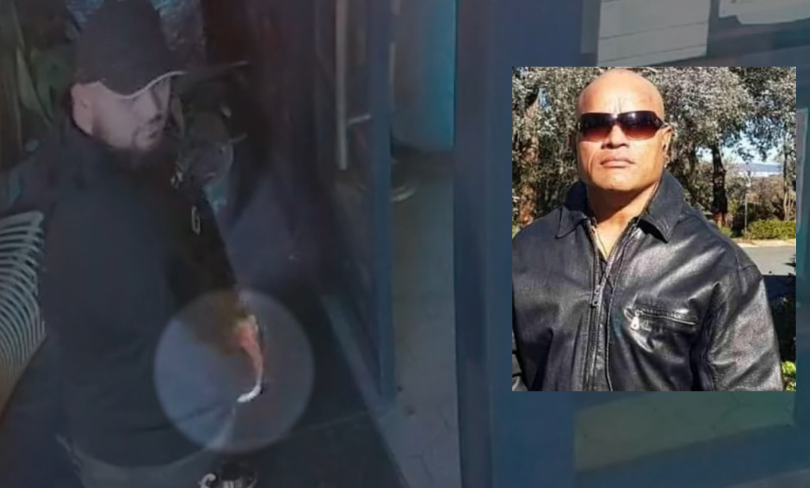
Frederick Tuifua (main photo) holds a knife outside Kokomo’s on 18 July 2020 before murdering Pitasoni Ulavalu (insert). Photos: Screenshot/Facebook.
The appeal against the Kokomo’s bikie boss murderer has been unanimously dismissed after it was launched by the DPP, who had argued the sentences he had been given were “manifestly inadequate”.
Frederick Elijah Mercy Tuifua stabbed Canberra Comanchero commander Pitasoni ‘Soni’ Ulavalu in the neck during a public brawl at the former Civic nightclub on 19 July 2020.
Ulavalu managed to stumble outside and died on the street.
Tuifua was sentenced to 20 years’ jail with a non-parole period of 11 years for the murder, as well as other charges, which meant he could be released from custody in 2031.
When the appeal was heard last year, Director of Public Prosecutions Shane Drumgold SC argued the sentence was clearly disproportionate, the murder was “inexplicable”, and the non-parole period was too low.
But when Chief Justice Lucy McCallum returned to the ACT Court of Appeal on Wednesday (15 February), she said she and her colleagues, Justices David Mossop and Robert Bromwich, had unanimously dismissed it.
The justices said the prosecution “faced a steep hurdle” when trying to find an error in the reasons given by the sentencing justice Michael Elkaim, remarking it “was not enough that a heavier sentence could have been imposed, or even should have been imposed”.
They noted the offences were “brutal and inexplicable”, and the murder had “devastated and ruined” the lives of Ulavalu’s family and friends, especially his wife and his child, who was born after his death, but had also ruined the lives of Tuifua and his family.
The justices said when it came to sentencing, the element of retribution did need to reflect community expectations, but sentences also had to take into account rehabilitation, “even if advancing that objective is not necessarily an overtly expressed public expectation”.
“Rehabilitation is not just vitally important for him [Tuifua] and his family, but also for the wider community,” they said.
They said the Crown had not found any errors with Justice Elkaim’s sentence and its argument was not more than “a complaint that the sentence was not heavy enough as a value judgment”.
“The sentence was not, in all the circumstances, shown to be inadequate, let alone manifestly so,” they found.
The justice said the circumstances of the murder were “undoubtedly troubling”, mainly because there was a “lack of any cogent explanation for why Mr Tuifua behaved in this way”.
This must result in legitimate concerns that “the promise of rehabilitation may prove illusory”, and they noted community safety may be a barrier to his release at the end of his non-parole period.
“That, however, is a matter for the Sentencing Administration Board to address,” the justices said.














As the Independent candidate for Canberra, I want to clarify that not all Independents are funded by… View